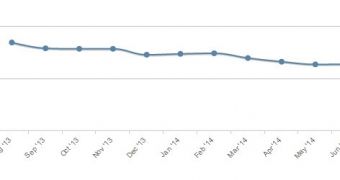A few weeks ago, we came across a discussion thread on Microsoft's support forums where users were asking for instructions on how to move from Windows 8, which is the company's modern operating system that's considered to be very secure and reliable, back to Windows XP, the platform that no longer receives updates and security patches since April.
While such a downgrade might sound pretty awkward for many consumers who are doing their best to remain secure and protect data by installing all latest versions of running apps, it seems like many are actually doing so.
Enter June 2014 statistics provided by market researcher Net Applications.
Windows XP, the operating system that was officially discontinued on April, actually gained more users last month, although everyone expected people to run away from it since it's officially an unsupported product.
The figures we are talking about reveal that Windows XP remains the second most-used operating system worldwide with a share of 25.31 percent after Windows 7, which is still installed on more than half of the desktop computers out there and has a share of 50.55 percent.
But what's more important is that Windows XP actually increased its share from the month before, and although the boost is nothing to be proud of, it's still a sign that not everyone is ready to make the switch to another operating system.
Microsoft does not agree with users deciding to stay on Windows XP and warns that an unsupported platform is extremely risky for you and your data as cybercriminals finding an unpatched vulnerability could easily break into the system to access personal files.
“Windows XP is 12 years old—that’s pretty old for an operating system. In the past 12 years you’ve probably gotten a new phone, maybe a new TV, and possibly even a new car. Maybe it’s time for a new PC too, so you can make sure you have more memory and storage, faster processing speeds, and a higher-quality display (some even come with touch). And they’re less expensive than you might think,” Microsoft says.
On the good side, plenty of third-party security vendors actually continue to provide support for Windows XP, so if you're yet to upgrade, there are lots of anti-virus solutions and firewalls out there that continue to work on this particular operating system. The problem is that at some point, everyone will eventually have to move to a newer Windows version.

 14 DAY TRIAL //
14 DAY TRIAL //